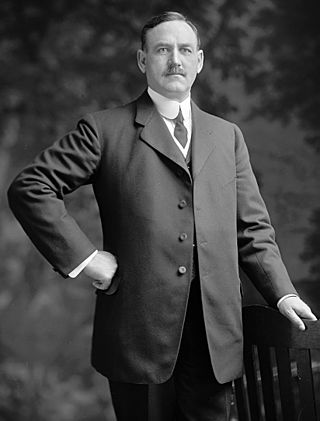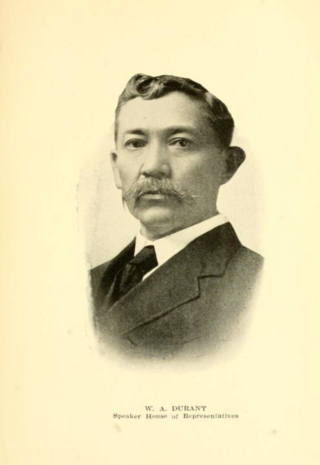Related Research Articles

Indian Territory and the Indian Territories are terms that generally described an evolving land area set aside by the United States government for the relocation of Native Americans who held original Indian title to their land as an independent nation-state. The concept of an Indian territory was an outcome of the U.S. federal government's 18th- and 19th-century policy of Indian removal. After the American Civil War (1861–1865),the policy of the U.S. government was one of assimilation.

The governor of Oklahoma is the head of government of the U.S. state of Oklahoma. Under the Oklahoma Constitution,the governor serves as the head of the Oklahoma executive branch,of the government of Oklahoma. The governor is the ex officio commander-in-chief of the Oklahoma National Guard when not called into federal use. Despite being an executive branch official,the governor also holds legislative and judicial powers. The governor's responsibilities include making yearly "State of the State" addresses to the Oklahoma Legislature,submitting the annual state budget,ensuring that state laws are enforced,and that the peace is preserved. The governor's term is four years in length.

Thomas Pryor Gore was an American politician who served as one of the first two United States senators from Oklahoma,from 1907 to 1921 and again from 1931 to 1937. He first entered politics as an activist for the Populist Party,and continued this affiliation after he moved to Texas. In 1899,just before moving to Oklahoma Territory to practice law in Lawton,he formally joined the Democratic Party and campaigned for William Jennings Bryan. In the Senate,his anti-war beliefs caused him conflict with Democratic presidents Woodrow Wilson and Franklin D. Roosevelt.

The Territory of Oklahoma was an organized incorporated territory of the United States that existed from May 2,1890,until November 16,1907,when it was joined with the Indian Territory under a new constitution and admitted to the Union as the state of Oklahoma.

William Judson Holloway was an American principal,lawyer,and politician who served as the fourth lieutenant governor of Oklahoma from 1927 to 1929. Following Henry S. Johnston's impeachment and removal from office,Holloway became the eighth governor of Oklahoma.

The Legislature of the State of Oklahoma is the state legislative branch of the U.S. state of Oklahoma. The Oklahoma House of Representatives and Oklahoma Senate are the two houses that make up the bicameral state legislature. There are 101 state representatives,each serving a two-year term,and 48 state senators,who serve four-year terms that are staggered so only half of the Oklahoma Senate districts are eligible in each election cycle. Legislators are elected directly by the people from single member districts of equal population. The Oklahoma Legislature meets annually in the Oklahoma State Capitol in Oklahoma City.

The lieutenant governor of Oklahoma is the second-highest executive official of the state government of Oklahoma. As first in the gubernatorial line of succession,the lieutenant governor becomes the new governor of Oklahoma upon the death,resignation,or removal of the governor. The lieutenant governor also serves as the president of the Oklahoma Senate,and may cast a vote to break ties in that chamber.

The Oklahoma House of Representatives is the lower house of the legislature of the U.S. state of Oklahoma. Its members introduce and vote on bills and resolutions,provide legislative oversight for state agencies,and help to craft the state's budget. The upper house of the Oklahoma Legislature is the Oklahoma Senate.

The Oklahoma Senate is the upper house of the two houses of the Legislature of Oklahoma,the other being the Oklahoma House of Representatives. The total number of senators is set at 48 by the Oklahoma Constitution.

The politics of Oklahoma exists in a framework of a presidential republic modeled after the United States. The governor of Oklahoma is both head of state and head of government,and of a pluriform two-party system. Executive power is exercised by the governor and the government. Legislative power is vested in the governor and the bicameral Oklahoma Legislature. Judicial power is vested in the judiciary of Oklahoma. The political system is laid out in the 1907 Oklahoma Constitution.

The Oklahoma Republican Party is an Oklahoma political party affiliated with the Republican Party. Along with the Oklahoma Democratic Party,it is one of the two major parties in the state.

The Kansas Senate is the upper house of the Kansas Legislature,the state legislature of the U.S. State of Kansas. It is composed of 40 senators elected from single-member districts,each with a population of about 73,000 inhabitants. Members of the Senate are elected to a four-year term. There is no limit to the number of terms that a senator may serve. The Kansas Senate meets at the Kansas State Capitol in Topeka.

Bird Segle McGuire was an American politician,a Delegate and the last U.S. Representative from Oklahoma Territory. After statehood,he was elected as an Oklahoma member of Congress,where he served four consecutive terms. He retired from politics in 1915. He was a cousin of William Neville.

The Sequoyah Constitutional Convention was an American Indian-led attempt to secure statehood for Indian Territory as an Indian-controlled jurisdiction,separate from the Oklahoma Territory. The proposed state was to be called the State of Sequoyah.

The Oklahoma Territorial Legislature was the legislative branch of the government of the Oklahoma Territory. It was organized as a bicameral legislature with a territorial council and a territorial house of representatives. They met for 120-day sessions in Guthrie,Oklahoma.
Arthur N. Daniels was the first House speaker of the Oklahoma Territorial Legislature and a member of the Oklahoma People's Party.

The First Oklahoma Legislature was the first meeting of the legislative branch of the government of Oklahoma,composed of the Oklahoma Senate and the Oklahoma House of Representatives. The meeting took place from December 2,1907,to May 26,1908,in the Guthrie City Hall Building during the first year of the only term of Governor Charles Haskell.

The Second Oklahoma Legislature was a meeting of the legislative branch of the government of Oklahoma,composed of the Oklahoma Senate and the Oklahoma House of Representatives,during the only term of Governor Charles Haskell. State legislators elected in 1908 met in the Guthrie City Hall Building from January 5 to March 12,1909. The state legislature also met in special session from January 20 to March 19,1910.

The Eighth Oklahoma Legislature was a meeting of the legislative branch of the government of Oklahoma,composed of the Oklahoma Senate and the Oklahoma House of Representatives. The state legislature met in Oklahoma City,in regular session from January 4 to April 2,1921,and in special session from April 25 to May 21,1921,during the third year of the term of Governor James B.A. Robertson. It was the first time,Republicans took control of the Oklahoma House of Representatives. In 1920,Bessie McColgin,a Republican,became the first woman elected to the Oklahoma House of Representatives. Lamar Looney,Oklahoma's first female state senator and a Democrat,was also elected in 1920.

William A. Durant was a Choctaw politician in the U.S. state of Oklahoma. A lawyer,he sat in the tribal legislature and later became Speaker of the Choctaw Nation before its annexation in 1906. He played a role in Oklahoma statehood and served in the Oklahoma House,rising to become its third Speaker. He was the sponsor of a bill that created Southeastern Oklahoma State University. He served later in life as chief of the Choctaw Nation during World War II.
References
- ↑ "George Washington Gardenhire (1841-1905) - Find A Grave Memorial".
- 1 2 3 4 5 George W. Gardenhire Archived 2010-05-27 at the Wayback Machine , Oklahoma Senate Archived July 9, 2013, at the Wayback Machine (accessed April 29, 2010)
- ↑ Rulon, Phillip Reed, "Oklahoma State University Archived 2010-05-15 at the Wayback Machine ," Encyclopedia of Oklahoma History and Culture Archived May 31, 2010, at the Wayback Machine (accessed April 29, 2010)
- ↑ Miller, Worth Robert, "Populist (People's Party Archived 2010-07-18 at the Wayback Machine ," Encyclopedia of Oklahoma History and Culture Archived May 31, 2010, at the Wayback Machine (accessed April 29, 2010)